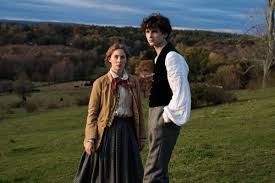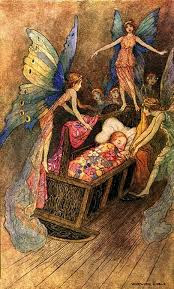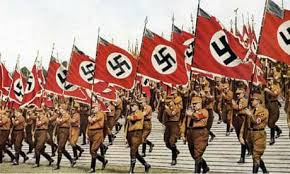As I child, I was given a copy of Little Women with a garish cover, and by the time I was nine, I had fallen in love with the book, in part with wonder at its strange (to me) sentimentalism. I reread it as an adult--my memory is that Roger and I read it aloud as newlyweds--and I reacted to the book in a different way than as a child. This time I appreciated the deep drenching sadness and loneliness--the bleak depression--Jo faces as an adult when her family of origin breaks apart. It is all loss for her: Meg marries and leaves to begin her own life, Amy travels with Aunt March to Europe, and the lingeringly ill Beth finally dies. Jo stares into a black abyss of desolate loneliness, full of longing for times past, when she had place and companionship. It is as bleak and realistic a portrait as any of what solitary people, male or female, in real life face as props are pulled away. I began to see this as an adult novel--and I think it is no accident that I have been drawn to figures like Austen and Bonhoeffer who faced similar loss.
This bleakness, however, is left out--if I remember correctly--of all the filmed versions I have seen. These cover the basic plot points and the happy marriages (along with the tear-jerking death of Beth) but elide Jo's internal anguish.
By using a flashback technique, Gerwig is able to incorporate Jo's suffering into the plot. The plot moves back and forth between the losses of the "present day," and the jolly days when the girls were all at home together. We encounter Jo, full of the confidence of youth and still surrounded by family, able to tell Laurie the truth: that she can't love him the way he wants. Later, with Beth dead and the house empty of sisters and laughter, Jo is broken, and marriage with Laurie, even if she doesn't love him, seems better than the heartbreaking, soul-killing alternative of loneliness, as she tells her mother. She puts a letter to Laurie, soon to return from Europe, in the knothole of a tree, telling him she will marry him--only to have to retrieve when he returns with Amy as his bride. This loneliness is central to the story Gerwig has to tell.
Gerwig is also able to avoid what I call the Hamlet problem through the flashbacks--in staging a story so iconic and well known, that has been "done" so many times, how do you avoid going through the predictable paces that cover the familiar episode set-pieces in a stale and predictable way? How do you keep it fresh? Flashbacks are Gerwig's answer--and I felt she handled them expertly.
On a deeper and broader level, I appreciated the humane vision that animated the film. It was beautiful in terms of costumes and settings, but also in terms of articulating generous and compassionate values. I loved, for example, the moment when Jo is urging Meg, more than half seriously, to run away with her rather than marry John Brooke. Meg says to her sister that they are different. The freedom and career Jo centrally hungers for is not the same as the love and domesticity Meg craves. Meg wants what she wants with the same fervor as Jo, and she tells her sister that both goals are worthy. One goal is not better than the other. One goal doesn't have to win, shriveling the other. One sister doesn't have to sacrifice her dreams for the other. The dreams can both coexist and both be good. I have never heard a better or a gentler rejoinder to the "Mommy Wars." Or a better rejoinder to triumphalism and hierarchy: Meg tells us we can all live and pursue our paths side by side and equally, and the world is richer for it. Meg is unthreatened by Jo's ambitions--and in the end Jo is unthreatened by Meg's. This is a world--fantasia though it might be at the present moment--that I would love to live in.
Gerwig also shows the four sisters as markedly different people and illustrates that all forms of being are acceptable. No one is judged. Meg wants husband and family: that is good and worthy. Jo is ambitious to become a published writer: ambition is good and worthy. Beth is a creative soul who wants to pursue the music she loves without any ambition to perform publicly or make a name for herself: that is good and worthy. Amy--an enormously well realized character in this film--wants material well-being because she knows what poverty and worry is: that is good and worthy. All of these woman achieve their goals--and all do so without selling their souls. They all love each other: whatever each one is is fine, and they don't have to be the same.
In this light, I loved Gerwig's handling of Professor Bhaer--made a young and attractive German counterpart to Laurie (though much poorer). Since I find the Professor Bhaer of the novel an overbearing, patriarchal jerk who takes it on himself to (very gently of course) to show Jo the folly of her ways as if she is silly child--judging her and finding her wanting--I derived intense satisfaction when Gerwig's Jo let's him have it with no holds barred. You go girl, as they say. And in Bhaer's (Frederick in the movie) defense, he did mean well--and Jo ultimately takes his advice.
Gerwig follows the plot of the 1994 movie in merging Jo the character with Alcott the author, and in the end, this Jo too pens Little Women--and the marriage with Bhaer is depicted as existing only in the fantasyland of literature. Gerwig's Jo stays, like Alcott, stubbornly single, showing the single path as another viable option for a woman.
The movie has been criticized for excising the Christian theme that structures events in the novel around Bunyan's Pilgrim's Progress, a book each girl receives early on as her sole Christmas gift. I noticed that and saw it as a reworking or even distortion of the book, but in today's political climate, with so much of evangelical Christianity prostrated to violent authoritarianism, Gerwig at least has avoided muddying her message or being co-opted into something she is not.
Men are peripheral in this novel, despite Meg's love of John, and Laurie's important part in the girls' lives. The women live their lives on their own terms, pursuing their own dreams. It was quite refreshing to me, coming after so many films that still--even in the second decade of the twenty-first century--exalt the great man surrounded by female handmaids ready to sacrifice their being for him and put up with his rages, moods, and betrayals--Phantom Threads jumps to mind--there are so many others, and we are prompted to receive them as great cinema, repugnant as they are. Some men may not like this movie, as no woman is ever a handmaiden--not even Meg to John. But it is a movie men can learn from. If our grand leader could understand its compassionate core, the world would be a different place.
Finally, it is the compassionate core that matters. The folding in of pain and suffering that Gerwig is able to achieve through her flashback technique is integral to not sentimentalizing her vision. This is a work of sentiment, but it is not sentimental in a false way that erases pain: Jo, for example, cries in anguish after she sells her hair.
There is so much more to say--and the film is not without its minor flaws and rubs but this is a defense--and I will end here. The costumes, settings, beauty, and female energy animating the movie are breathtaking. The compassion and affirmation of woman, of equality, of space for different kinds of lives to coexist without rancor or violence, should receive our strongest support as a vision of a world where we can all have life, fulfillment and hope without having to tear each other down.
I have not yet read a review, blog, or interview about this movie, though I am aware Amy's character has been praised and that the film has been overlooked for awards. Perhaps now that I have written about it from my own heart I will look at what others--including Gerwig--have to say.


























